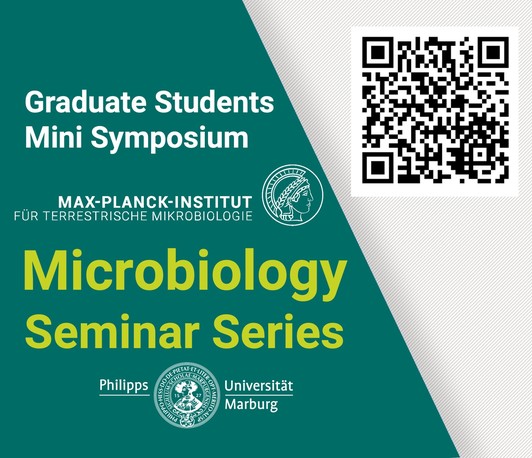Graduate Students Mini Symposium X-2023
Graduate Students Mini-Symposium
- Datum: 06.11.2023
- Uhrzeit: 13:15
- Ort: MPI for Terrestrial Microbiology
- Raum: Lecture Hall / Hybrid
- Gastgeber: IMPRS
- Kontakt: imprs@mpi-marburg.mpg.de

13:15 h Paul Alejandro Gomez Coronado - AG Erb
Design, construction, and
optimization of glycolaldehyde growth-coupled biosensors
Glycolaldehyde (GA), the smallest sugar molecule, holds promise as a future biomass-derived chemical. I explored various pathways for GA production and present two Escherichia coli strains as GA biosensors. The first strain relies on GA-dependent biosynthesis of essential compounds like pyridoxal-5-phosphate (PLP), while the second strain uses 2-ketoglutarate (2KG) auxotrophy. These sensors exhibit a wide sensitivity range towards GA, offering a versatile tool for detecting both externally added and internally produced GA. The biosensors have potential applications in metabolic engineering, enzyme discovery, and the advancement of biotechnological solutions.
13:45 h Sebastian Barthel - AG Erb
Prototyping a complex
enzyme cascade using in vitro transcription-based biosensing
The bioproduction of special and commodity chemicals is a crucial challenge to create a sustainable industry. Yet, the optimization of biological production systems is tedious and commonly restricted by slow and expensive sample analysis. To accelerate this process, we tested the use of low-cost and well-scalable in vitro transcription (IVT)-based biosensing. We tested the concept by prototyping the CETCH cycle, a synthetic CO2-fixation cycle producing glycolate. We constructed and characterized a glycolate-responsive biosensor and explored the effects of CETCH cycle components on the IVT system. Eventually we tested CETCH cycle samples with constant and varied cofactor composition which correlated well to LC-MS quantification.
14:15 h Jannik Harberding - AG Thanbichler
A
novel regulatory module important for cell cycle regulation in the stalked
budding bacterium Hyphomonas neptunium
The control of this intricate biphasic life cycle requires a precise regulation of cell cycle progression, morphogenesis and cell division. Here, we report the identification of a two-component signaling protein that is critical for normal growth and development in H. neptunium. A deletion mutant shows pleotropic defects, including severely swollen mother cell bodies and growth defects. This new regulator is part of a regulatory module whose components mediate essential cellular functions and show cell cycle-dependent localization patterns. Together, our results reveal the existence of a novel and conserved, regulatory pathway that contributes to the regulation of cellular development.